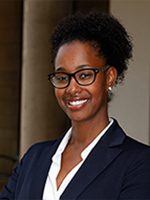Doctoral student Carliss Miller’s research borrows from old fishing wisdom: You don’t need to put a lid on a bucket of crabs to keep them from escaping. They will pull each other back down as they attempt to crawl to freedom. Her research takes on real-life issues minorities face in climbing the career ladder — and “out of the pot.”
Miller’s research finds that, counterintuitively, minorities can be each other’s worst enemies in the struggle to get ahead. The research earned first place for the Delores P. Aldridge Graduate Student Research Award at the recent Association of Social and Behavioral Scientists annual conference.

Miller, who is midway through her PhD studies at The University of Texas at Dallas Naveen Jindal School of Management, has used a newly developed tool for uncovering such biases, called “netnography.” She culls Internet blogs and posts to find narrative data — people “venting how they feel.” She has found that diversity reigns online, and she has uncovered a very diverse sampling for her studies.
One issue Miller faces is how “minority” is defined. Another is the perception that resources, whatever they may be — a better job, bigger office, higher pay, better educational opportunities — have limited availability to those in the minority. The result is what Filipino fishermen call “crabs in a pot” syndrome — no crab wants any crab to succeed in escaping. As a crab starts clawing its way to freedom over the open top, other crabs below pull it back down into the bucket, ensuring no crab is successful.
Similarly, those in the minority see limited resources or opportunities. In some cases, they do not want to help another within their group achieve a goal, fearing it could lead to their own diminishment. It is “if I can’t have it, neither can you” behavior.
While Miller’s research is still unpublished, it is getting media and scholarly attention.

Jindal School’s Dr. David L. Ford Jr., Miller’s mentor for this research and the one who suggested she submit her findings to ASBS, said Miller’s research “is breaking new ground in the study of workplace incivility since it examines a key violation of workplace norms.”
“In other words,” Ford said, “there’s an expectation of collaboration and in-group solidarity among persons belonging to an organizationally marginalized group.”
Ford said Miller is about a year away from submitting her research for publication. She is presenting her research again in August at the Academy of Management’s annual meeting, which is convening in Vancouver.
Miller, a doctoral student in international management studies who is interested in culture, diversity and workplace incivility, earned an MBA from the University of Florida. She was recruited to UT Dallas by Ford.
“Her research has the potential to shed light on what is perhaps a ‘taboo’ or non-discussable issue in organizational life,” Ford said.

